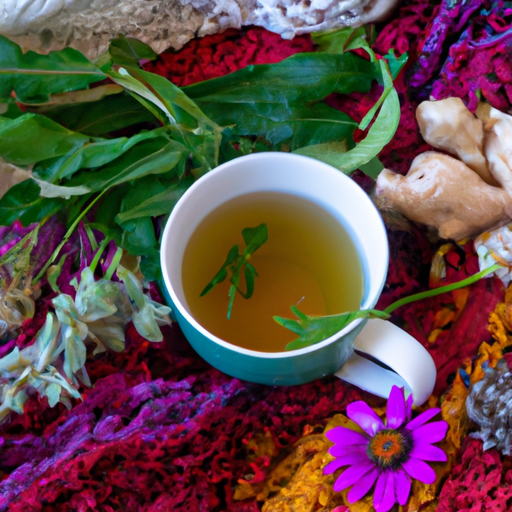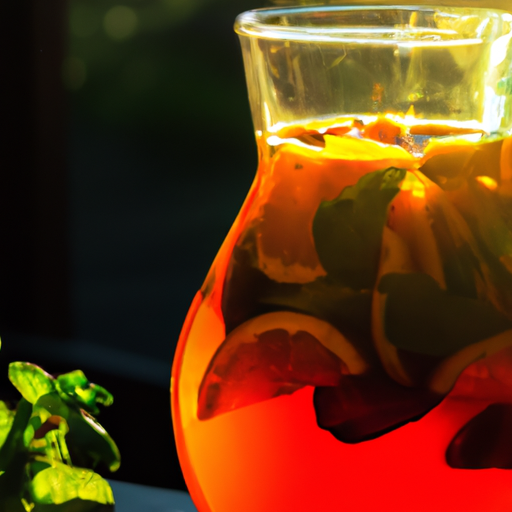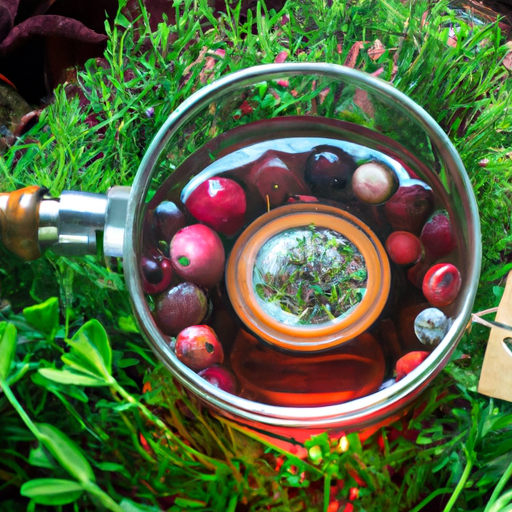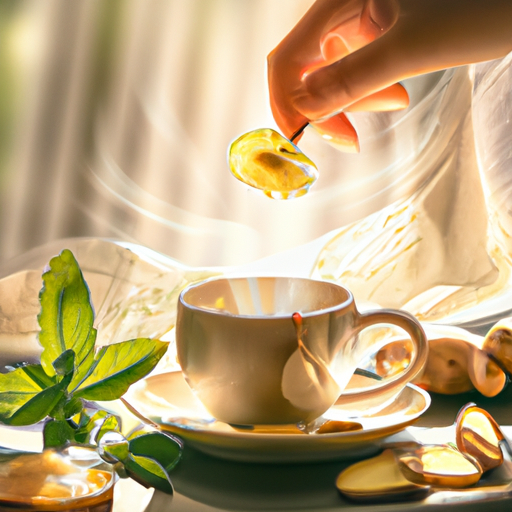Having the flu can be absolutely miserable. The body aches, the fever, the constant coughing and sneezing – it feels like you’ve been hit by a truck. But fear not, because I have a secret weapon that will help ease your discomfort: soothing stomach herbal tea.
Yes, you heard me right. This magical elixir can work wonders when it comes to soothing that queasy, upset feeling in your stomach that often accompanies the flu. Packed with natural ingredients like peppermint, chamomile, ginger, and more, these teas have been used for centuries to calm digestive issues and promote overall wellness.
In this article, I will introduce you to some of the best herbal teas for soothing your stomach during the flu and provide you with easy directions on how to brew them. So grab your favorite mug, sit back, and let the healing power of herbal tea work its magic.
Key Takeaways
- Peppermint tea can help relax gastrointestinal muscles and has antimicrobial properties, making it a good choice for soothing stomach discomfort during the flu.
- Chamomile tea is known for its calming properties and can help ease nausea, bloating, and indigestion.
- Ginger tea not only relieves digestive discomfort but also boosts the immune system and has anti-inflammatory properties.
- Fennel tea is effective in reducing bloating, easing indigestion, and calming an upset stomach.
Peppermint Tea
You’ll love sipping on a cup of refreshing peppermint tea to calm your upset stomach when you have the flu. Peppermint tea has numerous benefits for digestion, making it an ideal choice for soothing an unsettled stomach. The menthol in peppermint helps to relax the muscles of the gastrointestinal tract, reducing symptoms such as bloating, gas, and indigestion. It also has antimicrobial properties that can help combat any harmful bacteria in your digestive system.
To make homemade peppermint tea, simply steep a handful of fresh peppermint leaves in boiling water for about 5-10 minutes. You can also add honey or lemon for added flavor.
Now, let’s move on to the next section about chamomile tea, another wonderful herbal remedy for stomach discomfort.
Chamomile Tea
Relax and indulge in the comforting charm of chamomile, a soothing sip for your unsettled system.
Chamomile tea is not only a delightful beverage, but it also offers numerous benefits for those with a flu-induced upset stomach. Known for its calming properties, chamomile tea can help to ease nausea, bloating, and indigestion. It contains compounds like bisabolol and chamazulene, which have anti-inflammatory and anti-spasmodic effects on the digestive system.
To make chamomile tea, simply steep a chamomile tea bag or a teaspoon of dried chamomile flowers in hot water for about 5 minutes. You can also add a touch of honey or lemon for added flavor.
Soothing and gentle, chamomile tea is the perfect remedy for a flu-ridden stomach.
Now, let’s move on to the next section and explore the benefits of ginger tea.
Ginger Tea
Indulge in the invigorating warmth of ginger tea, a delicious brew that offers a multitude of health benefits to help soothe and invigorate your body. Here are four reasons why ginger tea should be your go-to remedy when you have the flu:
-
Digestive Aid: Ginger tea is known for its ability to relieve digestive discomfort, such as nausea and indigestion, making it an ideal choice when your stomach’s feeling queasy.
-
Immune Booster: Packed with antioxidants, ginger tea helps strengthen your immune system, giving your body the support it needs to fight off the flu virus.
-
Anti-inflammatory: The gingerols present in ginger have anti-inflammatory properties that can help alleviate symptoms like a sore throat and body aches.
-
Easy Recipe: To make ginger tea, simply steep fresh ginger slices in hot water for 10 minutes, strain, and enjoy!
Now, let’s move on to the next soothing tea in our lineup – fennel tea.
Fennel Tea
Experience the comforting embrace of fennel tea, a delightful elixir that will transport your senses to a fragrant garden of tranquility. Fennel tea is not only a soothing beverage, but it also offers numerous health benefits. It has been used for centuries to alleviate digestive issues and provide relief from stomach discomfort. This herbal tea is known for its ability to reduce bloating, ease indigestion, and calm an upset stomach. Moreover, fennel tea can be easily made at home by steeping a teaspoon of crushed fennel seeds in a cup of hot water for about 10 minutes. The resulting tea has a subtly sweet and licorice-like flavor that is truly refreshing. As we transition to the next section about lemon balm tea, let’s explore another herbal remedy that can provide comfort during the flu.
Lemon Balm Tea
Savor the delicate essence of lemon balm tea, allowing its refreshing aroma to transport you to a serene state of mind. Lemon balm, also known as Melissa officinalis, has been used for centuries for its medicinal properties. It’s known to soothe an upset stomach and relieve digestive issues, making it an ideal choice when you have the flu. Lemon balm contains compounds that have antiviral and antibacterial properties, which can help fight off the flu virus and reduce its severity.
To make lemon balm tea, simply steep a handful of fresh lemon balm leaves in hot water for about 10 minutes. You can also add a touch of honey or lemon juice for extra flavor. Incorporating lemon balm tea into your flu-fighting routine can provide you with a natural and calming remedy.
Now, let’s move on to the next section about licorice root tea.
Licorice Root Tea
Immerse yourself in the comforting embrace of licorice root tea, as its rich and velvety flavor envelops your senses like a warm, cozy blanket on a cold winter’s night.
Licorice root tea is derived from the Glycyrrhiza glabra plant and has been used for centuries in traditional medicine for its numerous benefits. This herbal tea is known for its soothing properties, which can help alleviate stomach discomfort caused by the flu. Licorice root contains compounds that possess anti-inflammatory and antiviral properties, making it an excellent choice for easing digestive issues during illness.
It is important to note that licorice root should be consumed in moderation due to its potential side effects, such as high blood pressure and low potassium levels. To enjoy the benefits of licorice root tea, steep one teaspoon of dried licorice root in hot water for about 10 minutes. Remember to consult with a healthcare professional for appropriate licorice root dosage.
Moving on to the next herbal tea, marshmallow root, let’s explore its soothing effects on the stomach.
Marshmallow Root Tea
Now let’s move on to another soothing option for a stomach herbal tea when you have the flu: Marshmallow Root Tea. Like Licorice Root Tea, Marshmallow Root Tea has been used for centuries to soothe various ailments, including stomach discomfort.
Marshmallow root is known for its anti-inflammatory properties, which can help reduce inflammation in the digestive tract, alleviating symptoms such as bloating and indigestion. It also forms a protective layer on the stomach lining, which can help soothe irritation caused by the flu.
To make Marshmallow Root Tea, simply steep 1-2 teaspoons of dried marshmallow root in a cup of boiling water for about 10 minutes. Strain and enjoy the warm and comforting tea.
Incorporating Marshmallow Root Tea into your flu-fighting routine can provide much-needed relief for your upset stomach, making your recovery a little more bearable.
Frequently Asked Questions
Are there any potential side effects or interactions of herbal teas with certain medications?
Potential risks of herbal tea interactions with certain medications should be considered. It is important to consult with a healthcare professional to ensure the safety and effectiveness of combining herbal teas with medications.
Can pregnant women or breastfeeding mothers safely consume these herbal teas?
Pregnant women and breastfeeding mothers should consult their healthcare provider before consuming herbal teas. Some herbal teas may pose potential risks during pregnancy and breastfeeding due to their active ingredients.
How long should I steep the herbal tea to get the best soothing effects?
To get the best soothing effects from herbal tea, steep it for 5-10 minutes. This steeping time allows the herbs to release their beneficial compounds, resulting in optimal results for your stomach.
Can children consume these herbal teas to soothe their upset stomach during the flu?
Children can benefit from alternative remedies like herbal teas for upset stomachs during the flu. However, it’s important to consult a healthcare professional for the appropriate children’s dosage and to ensure safety.
Are there any specific recommendations or precautions for individuals with pre-existing medical conditions, such as diabetes or high blood pressure, when consuming these herbal teas?
Individuals with pre-existing medical conditions, like diabetes or high blood pressure, should exercise caution when consuming herbal teas. It is recommended to consult with a healthcare professional for specific recommendations and guidance.
Conclusion
In conclusion, when you’re battling the flu and your stomach is feeling uneasy, turning to soothing herbal teas can provide much-needed relief. Peppermint tea is known for its calming properties and can help ease nausea and indigestion.
Chamomile tea has anti-inflammatory effects and can reduce stomach pain.
Ginger tea is a popular choice for settling an upset stomach, thanks to its anti-nausea properties.
Fennel tea can help soothe bloating and aid digestion.
Lemon balm tea has a calming effect on the stomach, while licorice root tea can help reduce inflammation.
Finally, marshmallow root tea can provide a protective coating for the irritated stomach lining.
Incorporating these herbal teas into your flu recovery routine can promote faster healing and alleviate discomfort.










